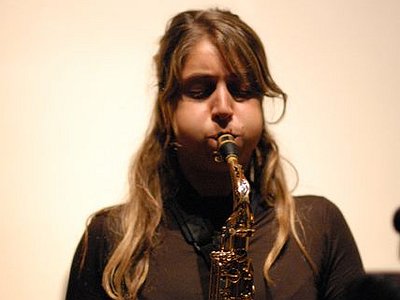The wind itself
Derek Bailey defined improvising as the search for material which is endlessly transformable. Regardless of whether or not you agree with his perspective, what kind of materials have turned to be particularly transformable and stimulating for you?
I approach sound as a malleable material, rich in concrete textures, which combine breath, silence and countless acoustic distortions. I'm exploring the microtonal aspects of the saxophone and its high-pitched tones, but also tonguing techniques, unpitched breaths, growls, sliced notes and breathy echoing sounds.
Also, for me, six codes or abstract parameters are important in the process of improvising:
- The time or the duration of a sound.
- The choice of the timbre in the surface in the pitch.
- The precision in the locations and the proportions.
- The density in the choice of volume or frequency.
- The intention or the dynamics.
- The articulation or transitions.
It was a long process for me to develop these parameters. It took me all my life to develop those ideas. But it's a process with no end, so it can change anytime.
There is a famous saying "ce qui compte ce n'est pas l'énoncé du vent, c'est le vent" that can be translated by "it's not how you say the wind that matters, but the wind itself". This is a little bit how I live the music.
Purportedly, John Stevens of the Spontaneous Music Ensemble had two basic rules to playing in his ensemble: (1) If you can't hear another musician, you're playing too loud, and (2) if the music you're producing doesn't regularly relate to what you're hearing others create, why be in the group. What's your perspective on this statement and how, more generally, does playing in a group compare to a solo situation?
The duo is for me the easiest and the most beautiful group. It is like an exchange. If you put four persons in a room, the conversation will be less fluid and more difficult. There will be alliances, disagreements. Improvised music is like a social network. Being two or being alone is sometimes easier.
I like also to play in a solo context. Actually, solo doesn't really exist because in solo, the room where you play becomes a partner too. The acoustic aspect of the room is important. Whether it's a dry place, a very resonant one or a noisy one, these factors can bring unexpected results. Also, the time, the weather or the accidents caused by the public can be a source of influence. Usually, I prefer to play inside in a very silent environment with a little bit of resonance. I like to be surrounded by the audience and not on a stage.
In solo, the concentration is also very different. Knowing that everything can happen in a visible and quantifiable geometry. Every sound, every gesture is important. The question is, why and how? What I am going to make now is going to change everything. How is it going to dictate the continuation to me? How can I go in and how can I go out of the shape? How does each sound have a secret tendency for the whole without ever being able to create the totality?
Some people see recording improvised music as a problem. Do you?
Absolutely not!! I would love to have more time to experiment with different recording, to use different mics, try different mixes ...
I'm very frustrated to be always on the road for concerts and not have more time for a residency where I can record what I want.








